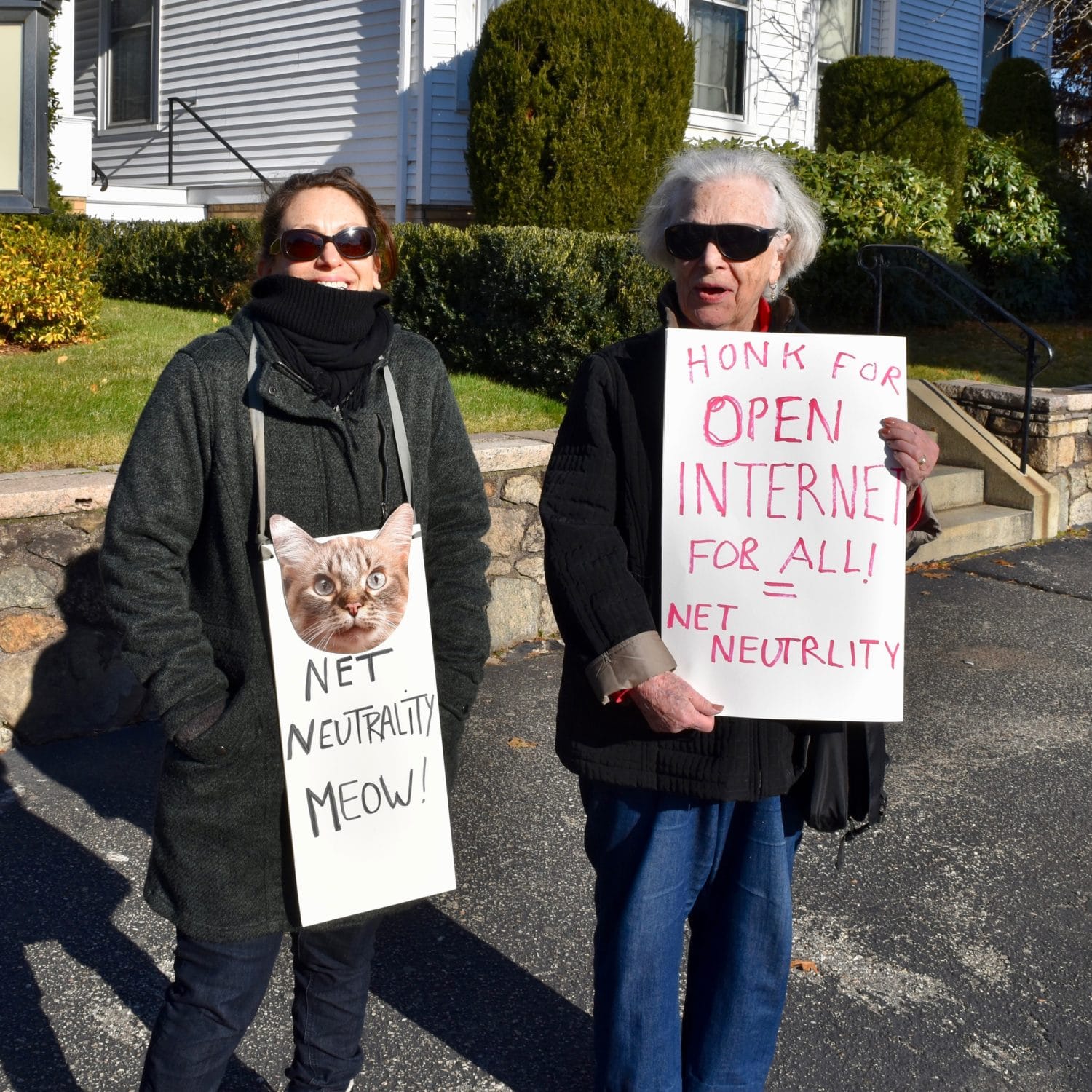The end of Net Neutrality threatens smaller news organizations like UpriseRI
“The press today is no longer a synonym for print or broadcast,” said Paola Prado, Ph.D., Associate Professor of Communication at Roger Williams University. “The 21st Century press distributes on line. Any Federal regulation or deregulation that limits access to the press does so in defiance of our First Amendment rights.” Prado was speaking a press conference held by Senator
December 14, 2017, 8:39 pm
By Steve Ahlquist
“The press today is no longer a synonym for print or broadcast,” said Paola Prado, Ph.D., Associate Professor of Communication at Roger Williams University. “The 21st Century press distributes on line. Any Federal regulation or deregulation that limits access to the press does so in defiance of our First Amendment rights.”
Prado was speaking a press conference held by Senator Jack Reed (Democrat, Rhode Island) last Friday.
“Let’s be clear: the repeal of Net Neutrality does not promote competition as the chair of the Federal Communications Commission (FCC) claims,” continued Prado. “What it does is allow telecommunication conglomerates to filter and funnel Internet access for profit… the FCC will have basically made the information super highway into a pricey toll-road for those who can afford it.”
Net Neutrality is a 2015 Obama-era rule protecting Internet access by requiring Internet service providers to treat all online content alike. Today the FCC voted of 3 to 2, along party lines, to end Net Neutrality. Trump-appointed Chairman Ajit Pai and Republican Commissioners Brendan Carr and Michael O’Rielly voted in favor of the order, while Democratic Commissioners Mignon Clyburn and Jessica Rosenworcel voted against.
If the repeal of Net Neutrality goes into effect, Internet service providers will be allowed to slow down traffic to some websites, or even block them, while charging consumers more money, all to the benefit of companies like Verizon.
UpriseRI.com will not be able to afford the “pricey toll-road” option. This means our little website might take a little extra time to load, if it’s allowed though the filters at all. At best the site might require more patience and more love if our content takes a little extra time to come through. At worst our website will be sidelined completely so that Verizon or Cox might offer their own news services.
Whatever happens, Uprise RI won’t stop, it just might get harder to find.
Meanwhile, some are saying that the end of Net Neutrality isn’t a done deal, or a permanent condition.
Senator Reed has joined with Senator Edward Markey (Democrat, Massachusetts) to unveil a plan to use the Congressional Review Act (CRA) resolution to effectively invalidate the FCC’s action and restore the 2015 Net Neutrality rules.
“Today’s partisan vote could be the start of more restrictive access to the Internet, and Congress must not let that happen,” said Reed. “Congress has the power to overturn this decision and ensure the Internet remains open and free for the American people. I urge my colleagues to support this CRA and invalidate the FCC’s ruling. This is important for our citizens, consumers, and free speech.”
The Congressional Review Act, according to Reed’s press release, “requires that all federal agency rules be reported to Congress and allows lawmakers 60 legislative working days to nix administrative federal regulations through an act of Congress with a simple majority in both chambers. Legislators of either party can petition to reverse agency rulings, after which Congress must consider a “resolution of disapproval” with a simple majority in the Senate. The resolution of disapproval would rescind FCC Chairman Ajit Pai’s decision and fully restore the Open Internet Order.”
If Reed’s CRA gambit fails, then perhaps one of the many lawsuits being brought to bear could kill the FCC’s plans. There is a lawsuit being launched by attorneys general from across the nation.
We anticipate signing on to the lawsuit and are awaiting the langauage of the lawsuit to properly evaluate it. https://t.co/40fNz8wimR
— AG Kilmartin (@AGKilmartin) December 14, 2017
Other lawsuits from consumer groups and First Amendment defenders might be filed as well.
If legislative gambits and lawsuits fail, then a new FCC could re-impose Net Neutrality years from now. A new Congress might overrule the FCC. A new President might install an FCC chair that isn’t a puppet for the likes of Verizon. But these solutions feel far away…
“Repealing Net Neutrality is a blow to a free and fair internet and the jobs that depend on it,” said Senator Sheldon Whitehouse (Democrat, Rhode Island). “It’s also a move based on a process that lacked basic transparency and a record full of fake or fraudulent comments that clearly don’t represent the views of the American people. The FCC is bowing to special interests and bots. Here’s the question: who’s behind the bots?”
“When working people pay their internet bill, they’re buying access to the full internet at the speed they pay for,” said Representative David Cicilline (Democrat, Rhode Island). “Today’s decision by the Republican-controlled Federal Communications Commission ends the era of the open internet. Ending Net Neutrality will allow internet service providers to slow speeds on certain websites, charge new fees, and even block websites altogether.” (Emphasis mine)






